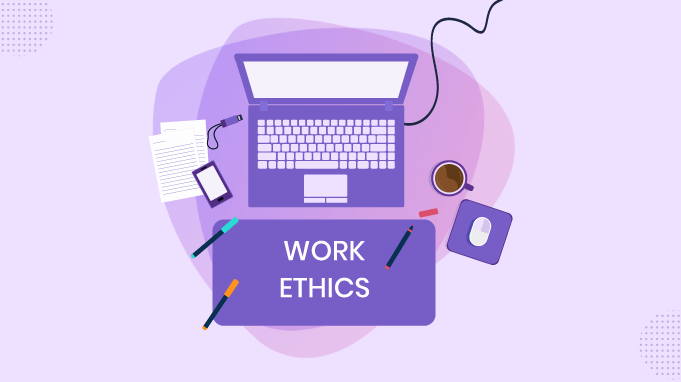Mastering Work Ethics: Ultimate Guide for Managers and Employees in 2024
If every successful person shares one common trait, it is a solid work ethic. From Amazon's CEO Jeff Bezos to Pepsico's CEO Indra Nooyi to Apple's Tim Cook, they have all achieved success after working incredibly hard on their way up.
Sports legends like Serena Williams and Michael Jordan achieved incredible career feats because of their hard work, perseverance, and discipline.
Key Takeaways
- Meaning and Importance of Work Ethics
- What are the 10 Ways Managers Can Instil strong Work Ethics Among Employees In A Workplace
- What is the Role of Employees in Upholding work ethics
- Types of Work Ethics with Examples
- Difference between Good and Bad work ethics
What are Work Ethics?
Work ethics are a set of moral principles or values employees abide by and use in their job performance. It covers an employee's behavior and attitude toward their job, career, and workplace.
Since childhood, we have known that a good work ethic leads to success. But how true is this? How is work ethic related to the productivity and success of a person?
Some primary elements of a strong work ethic are professionalism, integrity, respect for the work and fellow teammates, timeliness, and discipline.
This value of ethics molds a person into a more responsible and determined individual. It impacts all the activities of their day-to-day life.
If you work hard enough and assert yourself and use your mind and imagination, you can shape the world to your desires.
– Malcolm Gladwell
It is more significant in the workplace as it directly impacts the job's quality or output. People naturally become more productive when they respect the work and the workplace.
They use the company resources, value time, show better performance levels, and drive the company towards success.
Why are Work Ethics Important?
Work ethics function as a moral foundation of the workplace that assists us in governing our behavior, actions, and decisions in the professional scenario. Its implementation is vital to the managers and employees of an organization.
According to Zipdo, 79% of employees agree that work ethics are essential for career growth.
Let us witness how work ethics is important in molding a trustworthy and thriving work environment. The importance is discussed in the following section:
-
A strong work ethic at the organization helps create an environment of mutual respect and imbibes a sense of responsibility and integrity.
-
Employees with strong work ethics are more trustworthy. Trust, being the foundation of a professional setup, is difficult to build and sustain without ethical behavior.
-
Ethical employees are accountable for their actions and decisions rather than engaging in blame games and excuses for their errors. This accountability helps organizations in addressing problems effectively and make improvements if necessary.
-
Employees adhering to ethical principles such as discipline and honesty tend to be more productive in their respective roles.
-
It helps employees maintain their professionalism at work. This includes punctuality, respecting colleagues, clients, and superiors, and dressing appropriately.
Professionalism is central to creating a positive and productive work environment. -
Ethical behavior stimulates a culture of integrity, respect, and empathy among employees, enabling them to understand their customers' needs genuinely. Hence, it results in better customer service.
10 Ways How Managers Can Instil Strong Work Ethics Among Employees In A Workplace
1. Clear Goals and Objectives
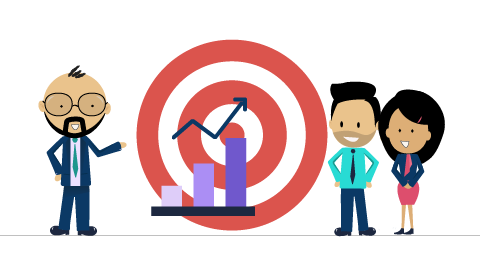
More often than not, it becomes difficult for employees to complete tasks without clear goals and objectives. Employees' work ethic strengthens when they are fully aware of their work.
Team leaders or managers should clearly explain the goals and objectives before they start new tasks; irrespective of talent and work experience, employees need direction. Every organization follows a definite corporate ethical culture. Therefore, managers need to align them with clear goals and objectives.
Hence, they can ensure the following points while they do it-
-
Goals should be measurable and maintain a fixed time frame.
-
It should be challenging and, at the same time, achievable.
-
It must be well accepted by the team members before implementation.
2. Proper Mentoring
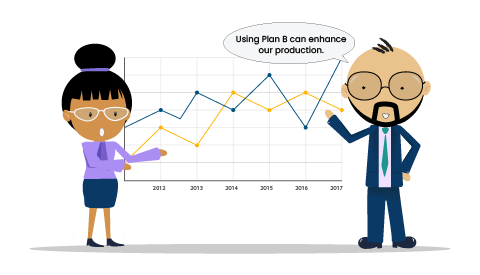
The delicate balance of mentoring someone is not creating them in your own image but giving them the opportunity to create themselves.
– Steven Spielberg
Managers should set clear goals and objectives regarding the organization's work ethics and code of conduct.
Once done, you must offer good mentoring and training programs to groom your employees. You must embrace your role as a teacher/ mentor and guide them in every step, especially in their initial days.
As managers, you need to use a combination of methods or approaches to mentoring them.
Try to make the instructions or lessons interesting using well-structured presentations, catchy graphics, or videos. During the mentoring process, ensure effective communication by conducting one-on-one meetings or timely team meetings.
3. Set a Good Example

If ethics are poor at the top, that behavior is copied down through the organization.
– Robert Noyce
If you want to instill good work ethics in your team, you must lead them from the front. Until and unless you (or the people at the managerial level) don't set the benchmark for your team, you can not expect great results.
Having an organizational code of conduct and ethics is crucial, but it is more important to ensure everyone abides.
Humans perceive through their senses and act accordingly. Therefore, you must be the torchbearer to ignite the light of dedication and commitment.
In other words, you should always 'Practice what you preach.' We are more likely to follow or do something relevant to us and have a good motive behind it.
When you motivate or lead your teams, you should always go back and forth and see if you have set a good example.
4. Create the Right Work Environment

A disorganized workspace means disorganized work habits. A sloppy work environment equals sloppy results.
– Larry Winget
A clutter-free work environment is a doorway for clarity of thoughts and ideas. It's a psychologically proven fact that our physical environment links directly to our mental well-being and productivity.
The aesthetics of the physical work environment differs from the organization's size. But you can always make it safe and friendly for your employees.
Ensure your employees feel safe without worrying about a confined desk or a power cut issue. It may not create much of a hurdle, but such minor issues' repetition impacts their work ethic.
This shows a less responsible attitude towards the employees and their needs. Eventually, this makes the employees less accountable for the work they do.
5. Professionalism
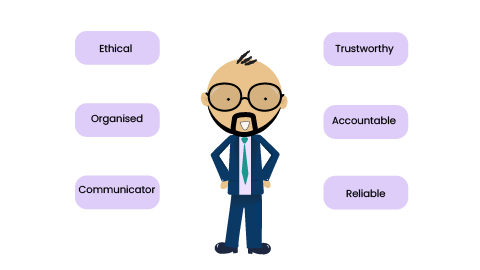
The essence of professionalism is the focus upon the work and its demands, while we are doing it, to the exclusion of all else.
– Steven Pressfiled
You know a real professional by the way they talk, dress, and conduct in the workplace.
A professional person exhibits a quality of craft and service.
Professionalism starts with trust, conduct, loyalty, discipline, and a hunger for excellence. Employees with this work ethic take work wholeheartedly and strive to bring excellence in whichever position they are into.
They are always respected for their conduct and no-nonsense attitude towards work. This draws the team members towards their vision.
Managers, therefore, can promote professionalism and bring goodwill to an organization.
Managers can stimulate professionalism by-
-
Keeping one’s word and trust.
-
Striving for excellence.
-
Being respectful, honest, and transparent.
-
Acting with integrity.
-
Keeping a learning attitude.
One with a professional work ethic is always well-perceived by their peers. And they always enjoy their work-life with contentment.
6. Discipline
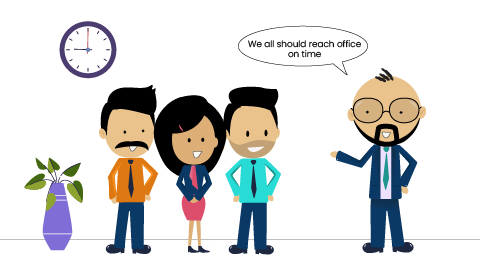
Discipline is the bridge between goals and accomplishment.
– Jim Rohn
It is one of the core elements of work ethics, and management must be very particular about this aspect. When discipline becomes part of the company culture, it will resonate with all your workforce employees.
Employers can positively overview their actions and reactions by instilling a culture of self-discipline.
Discipline begins with punctuality. Managers can put particular emphasis on maintaining punctuality in the organization. Punctual employees are less likely to take leaves. Also, employees who take leave frequently are considered a burden to the organization.
Discipline helps maintain the decorum of the workplace. Would you enjoy working in an environment with constant chattering? Or can you concentrate on your daily tasks with high disturbances?
Thus, discipline helps team members work efficiently towards the desired goals and objectives of the organization.
7. Understand your Employees’ Needs
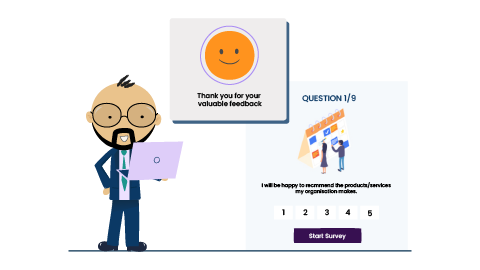
If you want to create a highly motivated workplace, you must acknowledge the needs of your employees.
Employees show high engagement and commitment when their needs are met. They also feel extra motivated and become more inclined towards the goals and vision of the organization.
Daniel H. Pink, in his non-fiction ‘Drive: The Surprising Truth About What Motivates Us,’ acknowledges the employees' need for Autonomy, Mastery, and Purpose.
Autonomy gives employees a self-direction. Mastery gives them confidence in their skills. And a sense of purpose makes their work meaningful to them.
The author also suggests that you should pay enough "to take the issue of money off the table."
Also, today, the need for employees varies. What worked in the past may not work today. Work trends are changing, and so are the employees' needs.
For example, working parents expect the flexibility to fulfill personal commitments. At the same time, a fresher would seek more training and development programs to improve their skills. And all of these directly impact the work that they do.
Therefore, understanding employees' needs helps stimulate performance and job satisfaction.
8. A Culture of Constant Feedback:
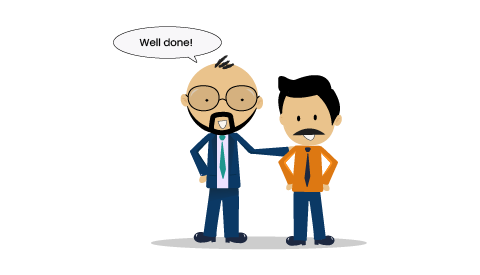
Elon Musk rightly said, “I think it’s very important to have a feedback loop, where you’re constantly thinking about what you’ve done and how you could be doing it better.”
Feedback is essential to the workplace communication cycle; hence, constant feedback is vital in nurturing an environment with good work ethics. Honest and constructive feedback is essential for any organization to build a decent company culture for continuous improvement.
Facilitate open discussions, transparent work culture, suggestions, and rigorous exchange of ideas and information. Update the norms of the organization with the latest and best trends from different parts of the world.
9. Fuel their Spirits
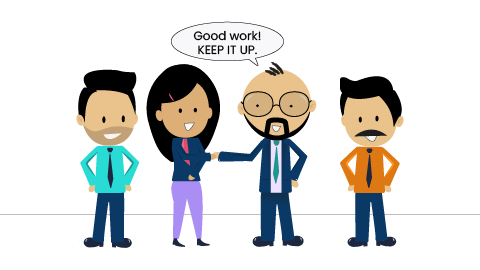
As mentioned in the previous points, management plays a vital role in fostering a good work ethic among employees. Another part managers can play in this equation is rewarding people for showcasing good work ethics.
Keep your eyes open and try to catch people in your company doing something right, then praise them for it.
– Tom Hopkins
Human beings have an intrinsic need to thrive for appreciation. Rewarding and recognizing is a good practice to maintain the momentum of appreciation. It acts as a motivator to "keep up the good work.”
Employees who set good examples for others through their sound work ethics are just as deserving of recognition as your best performers. You are responsible for fueling their spirits and making them feel valued and appreciated.
10. Eliminate Obstacles
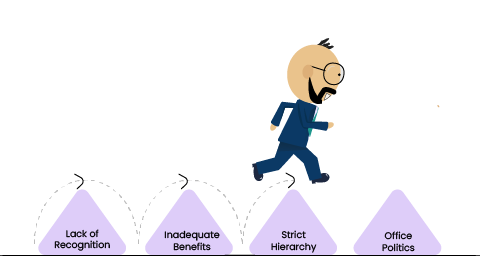
Finally, to instill strong work ethics among your employees, you must eliminate the hurdles in their way.
Identify the critical obstacles for your employees who are lagging behind in it. If your employees are disengaged and demotivated at work, the chances are high that they won't show strong ethics at work.
Negativity in the workplace, office politics, strict hierarchy, lack of recognition, and inadequate benefits can lower workplace morale. Remember, the values of ethics will only bear fruits when they come to employees intrinsically.
Do not act impatiently. Identify the factors, talk to them, and be respectful. It could be anything from internal miscommunication among team members to undefined company culture or any personal issues.
Keeping a regular check on these factors is the principalresponsibility of managers.
Role of Employees in Upholding Work Ethics
A manager does not always need to ensure the implementation of the work ethic and gauge its effectiveness. In fact, as employees, you can also efficiently play your part in upholding them.
A survey conducted by Zipdo showcases that an astonishing 83% of employees perceive work ethic as a significant trait in their coworkers.
Let us delve into the roles you can undertake to uphold them at your workplace.
1. Self-awareness and Reflection
Self-awareness is recognizing your values, strengths, beliefs, and weaknesses. This form of regular reflection helps you align your behavior with your values. It is significant because reflecting on your ethical behavior will help you understand your position.
That will make you less likely to engage in actions contradictory to your principles. Also, it will aid you in making ethical decisions by considering how your choices align with your beliefs.
2. Lead by Example
To lead by example means consistently displaying ethical behavior in your actions and decisions. When you act ethically, you set a standard for others to follow. Some of the instances of such actions are listed below:
-
Displaying respect and dignity for everyone.
-
Getting engaged in open and honest communication.
-
Abiding by company policies and ethical guidelines.
-
Making fair and unbiased decisions in all situations.
By doing so, you take a positive step in creating a positive workplace culture and simultaneously encourage your peers to value and practice ethical conduct.
3. Open Communication
Open communication implies seeking clarity when encountering ethical dilemmas and discussing them with colleagues and superiors. It is the best way to promote transparency and leave no room for misunderstandings.
When ethical concerns are openly addressed, you can collaborate to find solutions, and likewise, potential issues can be resolved before they even escalate.
4. Regular Learning
Work ethics have the ability to evolve with changes in laws, regulations, and industry practices.
Employees can keep employees updated with the latest ethical standards by engaging in continuous learning practices through workshops and training programs and staying updated on ethical guidelines.
5. Collaboration and Teamwork
Collaboration and teamwork involve respecting diverse perspectives and simultaneously addressing collective ethical challenges.
With the rise of ethical dilemmas such as conflicts of interest, whistleblowing, customer privacy concerns, employee treatment issues, etc, having your peers indulge in decision-making can lead to suitable solutions.
6. Feedback and Reporting
Providing constructive feedback to colleagues and superiors is crucial, particularly when ethical concerns are observed.
Suppose you witness unethical behavior such as discrimination, sabotaging colleagues’ work, displaying dishonesty, violating the company’s policies,etc. In that case, it is important to report it since it helps maintain the organization's integrity.
Reporting misconduct safeguards all stakeholders' interests, thereby contributing to a culture where unethical behavior is intolerable.
7. Personal Development
Seeking mentorship from experienced colleagues or mentors embodying a strong work ethic provides valuable guidance.
Participating in personal development activities like seminars, ethics reading, and leadership programs enhances your ethical understanding and professional growth.
Types of Work Ethics with Examples
The types can be categorized into dual approaches. Each approach has its way of perceiving the levels. Likewise, you will find an example attached to ease your understanding level.
Let us delve into both the categories separately.
Category 1
This particular category of work ethic emphasizes philosophical approaches to work and their associations with historical/cultural origins.
Protestant
Originated from the Protestant religious values, the protestant work ethic emphasizes self-reliance, hard work, and thriftiness that views work as possessing an inherent moral value. It perceives hard work and dedication as virtues.
Example: Jordan is a dedicated salesperson who arrives early and believes in the value of hard work. His commitment to excellence and self-reliance is evident in his proactive approach to customer interactions.
Utilitarian
It considers the idea of work as being useful and benefiting society. The emphasis is particularly on maximizing productivity and efficiency.
Example: Shirley, a dedicated nurse, maximizes patient care efficiency and outcomes. She ensures the greatest benefits for most patients by carefully managing resources and time. Her colleagues admire her passion for the greater good.
Entrepreneurial
It values the art of initiation and innovation. This work ethic is driven to start off new ventures and make practical accomplishments. The reward comes from their success.
Example: Alex converts a garage project into “SolarSwift,” crafting portable solar chargers. His bold vision and tireless innovation drove him to outshine his startup in innovation and market success.
Balanced
It emphasizes a balance between work and non-work areas. A balanced work ethic promotes a good quality of life by maintaining boundaries between professional and personal lives.
Example: Maya is a talented Graphic Designer who pours her passion into her projects. However, she equally values her personal time for her health, family, and travel. Setting boundaries between her personal and professional lives, Maya achieves professional success and a fulfilling life outside work.
Category 2
The following category undertakes an approach around ethical values and principles that guide individual conduct in the workplace.
Integrity
This work ethic inculcates honesty in all aspects of work. Individuals possessing a strong sense of integrity are transparent and trustworthy and uphold ethical standards in challenging situations as well.
Example: Emily, a sales representative, realizes that an error in product pricing could benefit her sales targets if left unnoticed. However, she reports the error to her manager and recommends rectifying it despite the fact that her commissions might get affected. Her honesty and ethical choice demonstrate a strong work ethic of integrity.
Adaptability
This ethic highlights the significance of adapting and embracing change. Adaptable individuals are open to learning new skills, adjusting to the evolving environment, and embracing innovation.
Example: Jamie, a marketing specialist, is accustomed to traditional advertising methods. However, when the company shifted focus to digital marketing, Jamie proactively and willingly learned new online strategies. This adaptability not only enhances Jamie's skills but also contributes to the company's successful transition.
Punctuality
It emphasizes the importance of arriving on time and meeting deadlines. Punctual individuals respect others’ time and demonstrate commitment to their work.
Example: Liam always ensures to arrive promptly at the team meeting. His punctuality testifies to his respect for his colleagues' time and his dedication to the project's success.
Confidentiality
It highlights the significance of respecting sensitive information and maintaining privacy. Individuals holding a strong sense of confidentiality can be entrusted with handling sensitive data and Keeping things confidential and professional.
Example: Sarah, an HR manager, happens to discover an employee's personal issue. And she handles that issue discreetly and professionally. Her ability to keep matters confidential earns her team's trust and reinforces a respectful work environment.
Difference Between Good and Bad Work Ethics
A comparison is always helpful to better understand any concept. Similarly, to understand what good work ethics entail, viewing it in light of bad work ethics is better.
Placing positives and negatives against each other in a comparison table will clear all your doubts.
| Good Work Ethics | Bad Work Ethics |
|---|---|
| Reliability: Fulfilling commitments and consistently meeting deadlines. | Unreliability: Frequently missing deadlines and not delivering on promises. |
| Punctuality: Arriving on time for work, meetings, and appointments. | Tardiness: Being consistently late without valid reasons. |
| Accountability: Being responsible for one's actions and outcomes. | Blame-Shifting: Avoiding responsibility and blaming others. |
| Dedication: Making consistent efforts and going the extra mile to achieve goals. | Lack of Initiative: Failing to take the initiative due to a lack of enthusiasm. |
| Professionalism: Maintaining respectful and courteous behavior in all interactions. | Unprofessional Behavior: Not professionally conducting oneself. |
| Teamwork: Effective collaboration and cooperation with colleagues to achieve collective goals. | Lack of teamwork: Refusing to cooperate or collaborate with others. |
| Adaptability: Showcasing flexibility to change and willingness to learn new skills. | Resistance to Change: Showcasing resistance to adapt to new processes or technologies. |
| Continuous Learning: Seeking opportunities to learn and improve. | Lack of learning: Reluctant to new learning and improvement. |
| Positive mindset: approaching work with a positive and proactive mindset | Dishonesty: Engaging in unethical behavior such as lying and cheating for personal gain. |
| Communication: Clearly and openly sharing information with colleagues and superiors. | Negative attitude: Approaching work with a rather negative mindset. |
Bottom line
Manifesting success and contentment is a continuous process; thus, one must have the commitment and right work ethic to achieve the same. You cannot paint the office walls with work ethic quotes and expect everyone to follow them.
Initially, it may work for you. But with time, a workplace culture evolves. So you cannot follow your old dos and don'ts. You must adapt and understand the employees' pulse and create an environment where everyone can thrive together.
Managers can help instill the above-discussed work ethics in a workplace and positively change the work culture.
What else can we do to instill a strong work ethic among employees? Do share your responses at editor@vantagecircle.com










